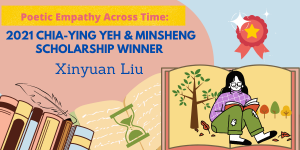
Liu Xinyuan, a 3rd-year Asian Language & Culture (Chinese Literature) major and Visual Arts minor at UBC, recently won the 2021 Chia-ying Yeh & Minsheng Scholarship, who was also the only recipient hailing from a university in North America. The scholarship was founded by UBC’s very own Professor Emerita Chia-ying Yeh along with the Minsheng Bank, and it was open to students from both Asia and North America. It aims to inspire students to dive deeper into classical Chinese poetry and culture. The applicants need to be equipped with not only prominent research competency, but also outstanding presentation skills in poetry recitation and analysis.
Xinyuan’s video submission for the Chia-ying Yeh & Minsheng Scholarship
From an early age on, Xinyuan developed a passion for classical Chinese poetry. Every night before bed, she and her mother would recite poems printed on the back of children’s magazines together. Those verses have since been seeded in her heart. A poem that leaves a lasting impression on Xinyuan is “In the Bamboo Pavilion” by Wang Wei. Not long after memorizing the poem, she would take walks in bamboo forests with her family, and amidst the bustling tourists, excitedly recite the poem. At that early age, she felt a strong empathy with the poetic lines.
For a long time, Xinyuan relied on her imaginative perceptions to empathize with different poets. After taking many inspiring courses at the Chinese Language Program, and the Department of Asian Studies at large, she gradually acquired the acumen of analyzing poems with a critical lens. So far, she has taken courses such as CHIN471: Later Classical Chinese Poetry (Tang) taught by Prof. Bin Zheng, ASIA375: Global Chinese Cinemas taught by Prof. Dongchen Hou, and so forth. From Prof. Xiaowen Xu, she has also taken CHIN461: Early Classical Chinese Poetry (to Han), CHIN463: Early Classical Chinese Poetry (Han to Tang), as well as CHIN466: Chinese Martial Arts Fiction. Indeed, the work Xinyuan used to apply for the scholarship is based on her final paper for CHIN463, which discusses The Song of the White Horse by the renowned poet Cao Zhi (192-232). In her research, she not only expresses her empathy towards the poet, but also critically analyzes the poetic passage, forming a conversation with the poet across thousands of years.
“I thought I should write something back to the poet. As if across the rushing river of time, I made a toast to to Cao Zijian and drank my beer.”
Through this competition, Xinyuan has learned the importance of adopting diverse perspectives when analyzing and appreciating poetry. Thanks to her professors’ guidance, she not only acquired more nuanced perspectives on classical Chinese poetry, but also learned to contextualize poems to tease out the greater significance inherent in subtle poetic details.
“Xinyuan is intelligent and open-minded. Her writing styles are as versatile as you can imagine. Step by step, she has acquired analytical approaches to classical Chinese poetry, and she has learned to articulate her original views clearly and argue for them eloquently with solid analysis, in oral and written forms.”
Instructor of CHIN 461, CHIN463, and CHIN466
According to Xinyuan, the competition has made her grow even fonder of and more interested in academic research on Classical Literature. She sees poetry as a cultural bridge, connecting past lives with those of the present who share the love for poetry.
“Poetry spans time, allowing us to connect with poets such as Cao Zijian, Su Dongpo, Huang Tingjian, and Xin Jiaxuan from thousands of years ago. It also spans across space, so there are passionate discourses concerning poetry in different corners of the world.”
Prof. Xu was proud of Xinyuan upon learning about her successful application, firmly believing that Xinyuan’s academic rigor and outstanding creativity will lead to greater academic success in the future. Moreover, Xinyuan also views this contest as a way to connect with other poetry aficionados, transcend the physical boundaries that separate them, and cultivate budding friendship across the world.
For students interested in Chinese literature like Xinyuan, the Chinese Language Program offers a variety of CHIN450+ courses covering a wide range of topics on Chinese literature and culture, from the past to the present. These courses are designed to foster students’ critical thinking and academic writing skills through literary and cultural analysis. They also offer information on such opportunities as the Chia-ying Yeh & Minsheng Scholarship to recognize students’ academic potential and achievements. Further information can be found on both the Chinese Language Program website and the UBC Academic Calendar.
Chinese Version:
目前就读于UBC亚洲语言与文化(中国文学)专业,同时辅修视觉艺术的大三学生刘馨源是2021年度叶嘉莹民生奖学金的15位优秀奖得主之一。该奖学金由UBC荣休教授叶嘉莹与民生基金会共同设立,旨在激励青年学者研究中国古典诗词,学习中国传统文化,来自亚洲和北美的大学生均可申请。申请者不仅需要有卓越的研究能力,还需要具备杰出的朗诵和解读诗歌的研究呈现能力。
馨源曾受教于郑彬教授的“CHIN 473: 宋到清的诗词”以及侯冬琛教授的“ASIA 375: 全球视角下的中国电影”课程,并在徐晓雯教授的CHIN 461、CHIN463、CHIN466三门课程中学习过。徐老师的前两门课程分别讲授从先秦到汉代以及魏晋南北朝的诗歌,第三门课程则探讨中国文学史中武侠小说的发展脉络。馨源用来参赛的作品即为她在CHIN463课程中有关曹植《白马篇》的期末论文拓展而成。她的研究中有对诗歌的感性理解,更有她运用课堂所学对诗句进行理性批判、分析得出的独特观点。这一篇论文是她与她挚爱的诗人相隔千余年进行的一场读者与作者的对谈。
“我想,我也该给他写点什么东西回赠,就好像隔着奔涌不息的时间长河,我对着曹子建遥遥酹一听啤酒。”
通过这次比赛,馨源领悟到多元视角分析诗歌的重要性,在论文中做到了以小见大、见微知著。
“馨源聪明好学。她的写作风格十分丰富。她一步步掌握了对中国古典诗歌的分析方法,掌握了学术研究的技巧和规则,学会了如何清楚地表达自己的独特观点,并通过严谨的分析论证这些观点。她的论文写得好,口述报告也做得漂亮。”
馨源认为,这次比赛激发了她对古典文学学术研究更多的兴趣。她认为诗歌是文化的桥梁,连接起了古人与今人,还有世上每一个赤诚的读诗人。
“诗歌跨越时间,让我们与千百年前的曹子建、苏东坡、黄山谷、辛稼轩他们有了联系;又跨越空间,让处在世界不同角落的读诗人之间有了联系。”
徐晓雯教授得知馨源获奖后,为她感到十分骄傲。徐教授认为馨源不仅才华洋溢,而且也相当谦虚:“申请奖学金是馨源释放自己创造力的一次好机会。我相信,她严谨的研究会在未来带来更多令人期待的学术成果。”
如果你是像馨源一样对中国文学感兴趣的学生,UBC中文项目提供了CHIN 450+一系列丰富的课程。这些课程与中国文学和文化紧密相关,也涵盖了从古至今的各个时期,并致力于培养学生通过批判视角审视各类汉语言文学作品,提升学术写作的能力,进而鼓励学生通过叶嘉英民生奖学金等机会证明、提升自己。更多信息可以从中文项目网站及UBC学术日历中获取。
Chinese article written by Jiaxin Yang
Chinese article edited by Michelle Zhang
English article written by Kelly Tan
English article edited by Shih-wei Wang